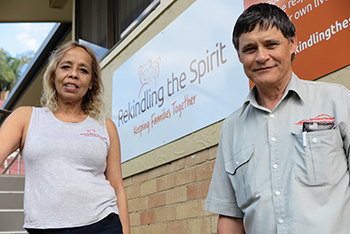Lismore-based organisation Rekindling the Spirit (RTS) is reporting positive signs from a federally-funded pilot program aimed at better supporting Indigenous people with co-occurring alcohol and other drug (AOD) and mental health issues.
The Co-Morbidity Model is funded under the Commonwealth Non Government Organisations Treatment Grant Program. It is focused on trialling holistic care for Aboriginal clients in the Richmond Valley area of the Northern Rivers where to date around 56 people over 18 years of age (most in their late 20s - early 30s) have been assessed, supported through counselling and referred to specialist services.
If the final evaluation of clinical outcomes is regarded as successful, and more funding is provided, the model could be extended throughout the extensive footprint of the North Coast Primary Health Network (PHN), which is overseeing the trial of the model. The pilot program’s initial funding of around $100,000 expires in January 2018.
The program is based on a comprehensive guidelines manual known as Comorbid mental disorders and substance use disorders issued by the Department of Health.
The pilot tailors the manual to the needs of local Aboriginal people who need help with concurrent AOD issues and mental health concerns that may not have been previously diagnosed, or are yet to be addressed through culturally appropriate care.
“Despite high rates of comorbidity among clients of AOD services, it is not unusual for comorbid mental health conditions to go unnoticed,” the manual notes.
“This is mostly because AOD workers are not routinely looking for them. It is a recommendation of these Guidelines that all clients of AOD treatment services should be screened and assessed for comorbidity as part of routine clinical care.”
What applies to the broader population is even more complex where Indigenous people are concerned, according to the RTS Comorbidity project coordinator, Sharmaine Keogh.
“Aboriginal people in general have been disenfranchised, displaced and marginalised. Colonisation has left its mark of entrenched prejudice, discrimination and transgenerational trauma. The historical removal of children has had a profound effect on Aboriginal People…
“The cohort of clients that engage in the RTS program more often than not present with myriad and complex issues, laden with layers of trauma and grief…
“Coping often by self-medicating with alcohol, illicit drugs and gambling, more often than not they been living in a toxic environment, where violence, abuse and self-medicating with alcohol and other drugs are normalised.”
Since the pilot began earlier this year, referred and self-referred clients have been assessed, counselled and supported in accessing GPs, Aboriginal Medical Services, detox and rehab, community and residential mental health, and other services.
A language-appropriate client leaflet has been circulated, asking questions such as, “Do you feel you are drinking too much? Are you using drugs”, and “Is it making you feel crazy; depressed, can’t sleep, thinking too much, feeling anxious, paranoid… Is your life out of control?”
Clients answering ‘yes’ to such issues are asked to make an appointment with RTS or Jullums AMS in Lismore.
“RTS looks more deeply into the issues, working towards the root causes,” Ms Keogh said.
“The programs are holistic in their approach, looking at the social determinants that might be impacting on their mental and physical health, such as housing, employment/training/legal needs. The success of the Comorbidity Model depends on all stakeholders working together to support the client’s treatment plan.
She added, “Counselling sessions are tailored to meet the individual’s needs, using therapies that inform the client of their need to change: Narrative, Motivational, Compassion, Logo Therapy, Expressive Art Therapies, Invitation To Take Responsibility.
“Facilitation of groups also looks at deep seated issues that have contributed to their behaviors of self-destruction, self-sabotage and the impacts on partners, families and the Community.”
RTS, whose core aim is “Keeping Families Together”, believes that offering a ‘one stop shop’ that is both culturally sensitive and clinically targeted is shaping up as a successful way of helping address this complex physical and psychological challenge.
While the final assessment of the pilot is yet to be done, the results are encouraging, according to Jeff Richardson, RTS Service Manager, who said it is vitally important that clients are offered services that encompass Physical, Social/Emotional, Spiritual and Mental aspects of wellbeing.
“The guidelines on the management of co-occurring alcohol and other drug use and mental health conditions in AOD treatment settings provides an evidence based mode of treatment, that meets the desired criteria,” Mr Richardson said.
“The project is an excellent example of an innovative and collaborative partnership between a Community, a Service Provider and a Funding Organisation, responding to the needs and wishes of the community,” he added.





